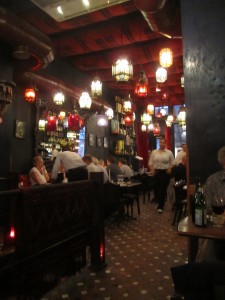I’ve been to on my own, the prospect of dinner alone the first night always intimidates me. My grasp of the language, if I do speak it, grows halting, my step on the threshold hesitant. I can’t decide if the eatery I’ve blundered into looks promising or if I’ve made a mistake: but really, it’s neither, just the fear of ordering and thereby confirming what must be obvious from my dress and demeanor: I’m a foreigner. It must be written on my face, the way nerd was when I loitered in the doorway at middle school dances, afraid to go in: into the dimness and the swaying and the crepe paper and the bored chaperones by the soft drinks. What the hell am I doing here? I don’t belong here.
You don’t want to be known—you want to pass as, be taken for—but you will be found out. My solution used to be the anonymity of fast food, served up by dead-eyed, indifferent cashiers, their curiosity extinguished by repetition and exhaustion. My first night in Edinburgh—my first time abroad, fourteen years ago—I wound up in a McDonald’s, sitting and stewing in a defeated embarrassment which, like the fear it had replaced, only I was aware of, even as I took comfort in the food’s familiarity.
Sunday night at six when I get in the hotel’s dead. I’m not sure why I expected some program coordinator to be on hand, or excited Fulbrighters to be chattering on lobby sofas. I’m the second-to-last to arrive—when the clerk hands me the information packet with my name on it, there’s only one more envelope waiting. I expected, I suppose, something like the first night of a conference: relaxed and informal introductions. Chill, not chilly. I expected us all to be on one floor and maybe one of the doors open, with someone spreading out their info packet on the bed, or some enterprising sort to be going around knocking, sticking a hand out, taking you aback with alpha extroversion. But there’s no bar and the breakfast-only restaurant is dark behind closed doors. After half an hour of strolling, and eyeing prices in the dimming evening, I walk into a warm Moroccan restaurant with many lanterns and low, plush red chairs. A few weeks earlier, a date to have tajine with a French friend had fallen through, and so now I give in to a deferred craving.

See, I think of dinner alone in a foreign town (unless I’m alone for unhappy, traumatic, etc. reasons) as a pleasure I can’t get enough of. There you are setting out on an adventure: will the food be good? Will the people be interesting to watch? Will the wait staff be nice, kind, rude, snobbish, helpful? And you are about to find out the answers to these questions in that odd and delicious state where you are simultaneously alone and not.
I find the spirit of adventure you describe elusive and unpredictable. You’d think first nights in foreign cities were made for its fairy guidance, but on some evenings it can suddenly alight on your shoulder and illuminate a place you thought you’d lived in too long to wonder at anymore.
My instinctive reaction is to claim that predictable thing: that I used to feel as you do, when I was younger, braver, and more trusting, but I don’t think that’s true. I want to say it’s more like the second night for me, but that’s not quite right either. I probably used to fret and stress just as much as I do now, I merely had more furious powers of denial to put it from my mind. I would often do things on a whim–for the idea, I think, of having done them–but not pick up all that much from the doing of them, because the whole time I’d actually be sort of distracted by nerves—and not even really know it enough to own up to it. Nevertheless, I am less trusting, and less… certain of fate’s benevolence. I’m not sure when this changed, but I take as a symbol of it my inability to fall asleep in public places, whereas I used to just nod blithely off.
But maybe none of this matters. Maybe in this case it’s just that I’d come from ten days with a good friend, and now she was gone.
I like that. The ability to sleep in public places as a barometer for certainty of fate’s benevolence.
At Clarion, I developed the habit of falling asleep on sofas in the midst of conversations, and waking up, now and then, to offer belated, dream-mangled observations on poorly overheard points.
Maybe your fret and stress is just an indication of more thought. You actually consider the roads that drift off the “what if?” instead of walking past them with a vaguely silly appreciation for how nice they look.